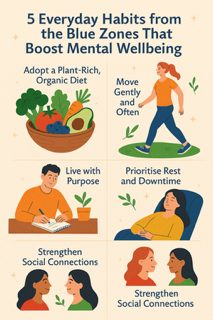October is Breast Cancer Awareness Month — a time to honour those affected, raise awareness, and reflect on how our daily choices can support long-term breast health.
While we often associate breast cancer risk with genetics, research shows that nutrition and lifestyle play a significant role in prevention and hormone balance, particularly for women over 40.
Hormones, Ageing, and Risk
As we move through our 40s, hormonal shifts — especially around perimenopause — naturally influence how our bodies process oestrogen. When oestrogen levels become imbalanced, it can contribute to breast tissue changes and, over time, increase cancer risk.
The encouraging part? Diet can help regulate hormones and support detoxification, reducing the load on the liver and helping the body maintain healthy balance.
Nutrition for Breast Health
Here are some ways you can support your body through the power of food:
- Add cruciferous vegetables – Broccoli, kale, cabbage, and Brussels sprouts contain compounds that support oestrogen metabolism and detoxification.
- Eat a rainbow – Colourful fruits and vegetables are rich in antioxidants that help protect cells from damage.
- Prioritise fibre – Whole grains, beans, and seeds help the body eliminate excess hormones and toxins.
- Include healthy fats – Oily fish, walnuts, flaxseed, and olive oil support hormone production and reduce inflammation.
- Limit alcohol – Even small amounts of alcohol are linked to increased breast cancer risk. Try replacing it with herbal teas, kombucha, or sparkling water.
Lifestyle Matters Too
- Move regularly — exercise helps regulate insulin, improve circulation, and support hormone balance.
- Sleep and stress management — high stress and poor sleep can alter hormone function and increase inflammation.
- Stay informed — attend regular screenings and know your body’s normal.
A Month to Reflect and Reset
Breast Cancer Awareness Month isn’t just about awareness — it’s about action. Small, sustainable habits truly matter. Nourishing your body with balanced nutrition, reducing stress, and making time for regular movement all contribute to lasting health and resilience.
Your body is incredibly responsive. The choices you make today can help shape a healthier tomorrow.
To your health and wellbeing,
Milvia Pili FNTP
Nutritional Therapist




